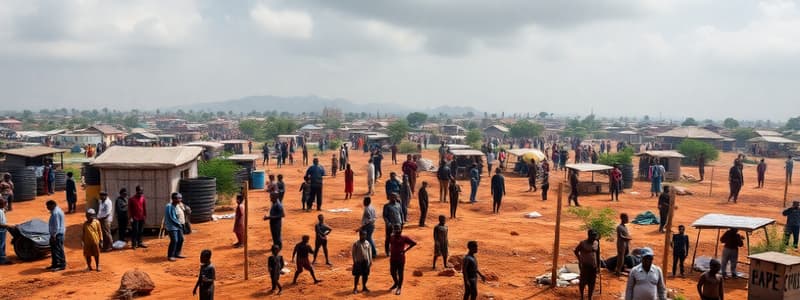Podcast
Questions and Answers
Which historical event led to a significant doubling of the population in the 19th century?
Which historical event led to a significant doubling of the population in the 19th century?
- The Space Age
- The Neolithic Revolution
- The Digital Revolution
- The Industrial Revolution (correct)
What is the definition of birth rate?
What is the definition of birth rate?
- The total number of people born in a region
- The number of people who die in a year per 1,000 people
- The average age at which people have children
- The number of babies born in one year per 1,000 people (correct)
Which of the following correctly represents South Africa's birth rate?
Which of the following correctly represents South Africa's birth rate?
- 20 babies per 1,000 people
- 30 babies per 1,000 people
- 19 babies per 1,000 people (correct)
- 15 babies per 1,000 people
What impact does a high death rate often indicate in a population?
What impact does a high death rate often indicate in a population?
Which of the following factors is NOT a cause of population growth?
Which of the following factors is NOT a cause of population growth?
What is the death rate for Swaziland?
What is the death rate for Swaziland?
Which is the average death rate for the world?
Which is the average death rate for the world?
What concept refers to individuals moving into a country?
What concept refers to individuals moving into a country?
What effect does a high birth rate and low death rate have on a population?
What effect does a high birth rate and low death rate have on a population?
How is the population growth rate defined?
How is the population growth rate defined?
What is considered a sign of a well-functioning health system in a country?
What is considered a sign of a well-functioning health system in a country?
Which country had the highest life expectancy according to the provided data?
Which country had the highest life expectancy according to the provided data?
What primary influence does economic development have on population growth rate?
What primary influence does economic development have on population growth rate?
When measuring infant mortality, what does the rate indicate?
When measuring infant mortality, what does the rate indicate?
What demographic condition may lead to a higher birth rate in a population?
What demographic condition may lead to a higher birth rate in a population?
What is a likely implication of a country having a high infant mortality rate?
What is a likely implication of a country having a high infant mortality rate?
What formula can be used to calculate population growth?
What formula can be used to calculate population growth?
Flashcards are hidden until you start studying
Study Notes
Population Concepts
- Human population growth has accelerated rapidly, particularly during the Neolithic and Industrial Revolutions.
- The Industrial Revolution led to a tripling of the world's population in the 20th century.
- Causes of population growth include fertility rates, longer life expectancies, and migration.
- Consequences of population growth include increased climate change, decreased food security, biodiversity loss, and overexploitation of resources.
Birth and Death Rates
- Birth rate is measured as the number of babies born per 1000 people in a year.
- The global average birth rate is 20 babies per 1000 people.
- South Africa has a birth rate of 19 babies per 1000 people.
- Death rate is measured as the number of deaths per 1000 people in a year.
- The global average death rate is 8.6 people per 1000 people.
- South Africa has a death rate of 15 per 1000 people.
- Swaziland has a high death rate of 30 per 1000 people, but also a high birth rate of 30 per 1000 people.
- Japan has a high death rate due to a large elderly population.
- Immigration increases a country's population, while emigration decreases it.
Population Growth Rates
- A country's population growth rate is the annual increase in population.
- It is calculated by: (birth rate + immigration rate) – (death rate + emigration rate).
- A positive growth rate indicates population growth, while a negative rate indicates population decline.
Infant Mortality Rates
- Infant mortality rate is the number of babies that die before their first birthday per 1000 births.
- The global average infant mortality rate is 27 per 1000 births.
- South Africa has an infant mortality rate of 24 per 1000 births.
- High infant mortality rates can indicate a weak healthcare system.
Life Expectancy
- Life expectancy is the average lifespan of individuals in a population.
- The global average life expectancy in 2022 was 73 years.
- On average, women live longer than men, with a life expectancy of 73.8 years compared to men's 69.1 years.
- South Africa's life expectancy is 62.9 years.
Other Factors Influencing Population Growth
- Migration patterns can significantly impact population growth in specific regions.
- A population with a high proportion of young people typically has a higher birth rate and lower death rate.
- Economic development plays a key role in population growth rates, often leading to lower rates due to improved healthcare, education, and family planning.
Studying That Suits You
Use AI to generate personalized quizzes and flashcards to suit your learning preferences.




